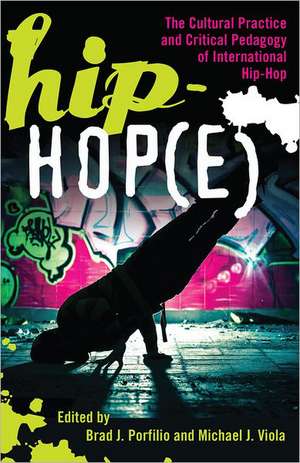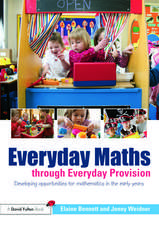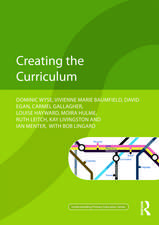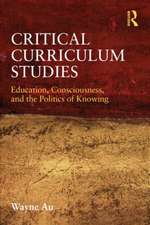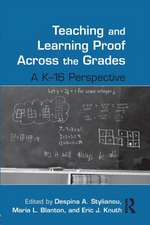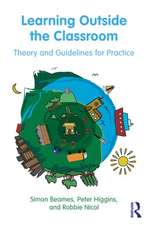Hip-Hop(e): Adolescent Cultures, School, and Society, cartea 56
Editat de Brad J. Porfilio, Michael J. . Violaen Limba Engleză Paperback – 27 mar 2012
Preț: 389.59 lei
Nou
Puncte Express: 584
Preț estimativ în valută:
74.56€ • 80.96$ • 62.63£
74.56€ • 80.96$ • 62.63£
Carte tipărită la comandă
Livrare economică 23 aprilie-07 mai
Preluare comenzi: 021 569.72.76
Specificații
ISBN-13: 9781433114328
ISBN-10: 1433114321
Pagini: 329
Dimensiuni: 147 x 221 x 20 mm
Greutate: 0.48 kg
Ediția:Nouă
Editura: Peter Lang Gmbh, Internationaler Verlag Der W
Seria Adolescent Cultures, School, and Society
ISBN-10: 1433114321
Pagini: 329
Dimensiuni: 147 x 221 x 20 mm
Greutate: 0.48 kg
Ediția:Nouă
Editura: Peter Lang Gmbh, Internationaler Verlag Der W
Seria Adolescent Cultures, School, and Society
Notă biografică
Brad J. Porfilio is Associate Professor of Education at Lewis University. He received his Ph.D. in sociology of education at the University of Buffalo. He has published numerous peer-reviewed articles, book chapters, edited volumes, and conference papers on the topics of urban education, youth culture, neoliberalism and schooling, transformative education, teacher education, gender and technology, and cultural studies. Michael J. Viola is a doctoral candidate in the Graduate School of Education and Information Studies (Urban Schooling) at the University of California, Los Angeles. His work has been published in the peer-reviewed journals Amerasia, Socialism and Democracy, and the Journal for Critical Education Policy Studies. He is also a contributor to the anthology titled Peter McLaren, Education, and the Struggle for Liberation and is co-author (with Kent Wong) of Miguel Contreras: Legacy of a Labor Leader.
Cuprins
Contents: Michael Viola/Brad J. Porfilio: Hip-Hop(e): Introduction: The Cultural Practice and Critical Pedagogy of International Hip-Hop - Muna Jamil Shami: Toward a Critical Pedagogy of Possibility: Arab American Hip-Hop and Spoken Word as Cultural Action for Freedom - J. Lorenzo Perillo: An Empire State of Mind: Hip-Hop Dance in the Philippines - Ove Sernhede/Johan Söderman: Hip-Hop in Sweden - Folkbildning and a Voice for Marginalized Youth - Leslee Grey: True Fuckin' Playas: Queering Hip-Hop through Drag Performance - Michael B. MacDonald: Hip-Hop Citizens: Local Hip-Hop and the Production of Democratic Grassroots Change in Alberta - Brad J. Porfilio/Shannon M. Porfilio: Hip-Hop Pedagogues: Youth as a Site of Critique, Resistance, and Transformation in France and in the Neoliberal Social World - Crystal Leigh Endsley/Marla Jaksch: The Troubadour: K'Naan, East Africa, and the Trans-National Pedagogy of Hip-Hop - Michael Viola: Hip-Hop and Critical Revolutionary Pedagogy: Blue Scholarship to Challenge 'The Miseducation of the Filipino' - Darius Prier: Public Enemies: Constructing the 'Problem' of Black Masculinity in Urban Public Schools - Brian Lozenski: Rebellion Politik: A Tale of Critical Resistance through Hip-Hop from St. Paul to Havana - Travis L. Gosa/Tristan G. Fields: Is Hip-Hop Education Another Hustle? The (Ir)Responsible Use of Hip-Hop as Pedagogy - Lisa William-White/Dana Muccular/Gary Muccular: Reading, Writing, and Revolution: Spoken Word as Radical 'Literocratic' Praxis in the Community College Classroom - Debangshu Roychoudhury/Lauren M. Garder: Taking Back Our Minds: Hip-Hop Psychology's (HHP) Call for a Renaissance, Action, and Liberatory Use of Psychology in Education - Jeremy Bryan: R.U.N.M.C. (Are You an Emcee?) or Rhetoric Used Now to Make Change - Akesha Horton: Hip-Hop as a Global Passport: Examining Global Citizenship and Digital Literacies through Hip-Hop Culture - Don C. Sawyer III: Stupid Fresh: Hip-Hop Culture, Perceived Anti-Intellectualism, and Young Black Males - Decoteau J. Irby/Emery Petchauer: Hustlin' Consciousness: Critical Education Using Hip-Hop Modes of Knowledge Distribution.
Recenzii
In a world in which cultural production and youth culture is becoming globalized and commodified, and in which the power of global capitalism seems insurmountable, this volume suggests there is reason to be hopeful that new forms of resistance and intellectual artistry are also developing that are counter-hegemonic. (Dennis Carlson, Professor, Miami University, Ohio) 'Hip-Hop(e)' emancipates critical pedagogy from the postmodernist trap that has long ensnared it within universities and helps us to understand hip hop as much more than a vehicle for capitalist cliches of materialism and individualism. (Wayne Ross, Professor, University of British Columbia; Co-editor of 'Critical Theories, Radical Pedagogies, and Social Education ') [This] book contributes to the fields of hip-hop studies as well as critical pedagogy, merging research and activism and exploring hip-hop as a world view, aesthetic, politics, critical lens, and practice that can profoundly shape teaching and learning in informal and formal educational contexts. (Bronwen Low, McGill University, Author of 'Slam School: Learning through Conflict in the Hip-hop and Spoken Word Classroom') This volume is an important new contribution to the literature on critical pedagogy, and to the re-invention and re-vitalization of critical pedagogy in new and unsettling times. The authors seek to move critical pedagogy beyond the American academy to a global stage, connect it to the lived experiences and political praxis of marginalized and oppressed youth, and demonstrate how it can be used to connect the local and the global in struggles for social justice. In a world in which cultural production and youth culture is becoming globalized and commodified, and in which the power of global capitalism seems insurmountable, this volume suggests there is reason to be hopeful that new forms of resistance and intellectual artistry are also developing that are counter-hegemonic. All of this raises profound questions about what it means today to educate for what Paulo Freire called 'conscientization.' (Dennis Carlson, Professor, Miami University, Ohio) Hip-Hop(e) emancipates critical pedagogy from the postmodernist trap that has long ensnared it within universities and helps us to understand hip hop as much more than a vehicle for capitalist cliches of materialism and individualism. The editors and authors of Hip-Hop(e) illustrate how both of these cultural practices emerged from class struggle and have evolved as radical, transformative cultural forms essential in responding to questions of racialization, dispossession, imperialism, and subjugation. (E. Wayne Ross, Professor, University of British Columbia; Co-editor of 'Critical Theories, Radical Pedagogies, and Social Education') This lively collection demonstrates hip-hop culture's range and reach, as it is mobilized and reinvented to suit the needs of different contexts and communities. Its contributors document and critically engage with hip-hop's transnational incarnations, from break-dance in the Philippines and popular education in Sweden to drag king shows in Atlanta, Georgia, in light of (and in resistance to) the politics of neoliberalism as well as processes of social marginalization. The book contributes to the fields of hip-hop studies as well as critical pedagogy, merging research and activism and exploring hip-hop as a world view, aesthetic, politics, critical lens, and practice that can profoundly shape teaching and learning in informal and formal educational contexts. (Bronwen Low, McGill University, Author of 'Slam School: Learning through Conflict in the Hip-hop and Spoken Word Classroom')
